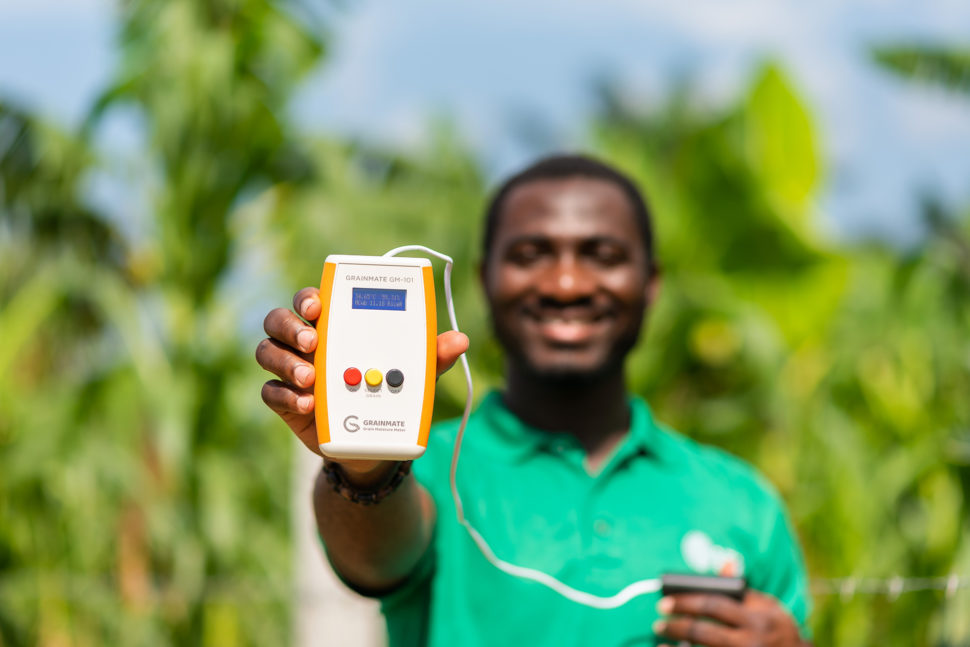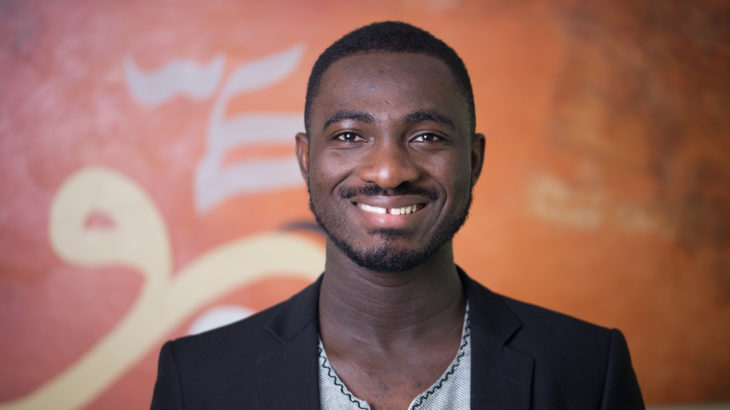My name is Isaac Sesi. I am the founder of Sesi Technologies, a Ghanaian agritech company that is empowering African farmers and agribusinesses with affordable technologies and services.
Currently, more than 1,000 farmers and agribusinesses use our suite of post-harvest solutions to reduce grain losses, increase productivity, and discover premium markets.
Here’s how I became an agritech entrepreneur.
Growing Up in Accra, Ghana
I grew up in Accra, the capital of Ghana in a house that had neither running water nor electricity. Not having access to TV, like other regular kids my age, meant that I had a lot of time on my hands, which I spent dissecting broken electronic gadgets and tinkering with parts I harvested. With time my love for electronics grew.
In high school, I made friends who had similar interests, and we spent a lot of time building electronics projects together. Our projects included a PA system for our National Science and Maths Quiz team, a multipurpose cooker to make our own food when we got tired of eating from the boarding school dining hall, and several other science projects we built for our school’s annual science fairs. By the time I was leaving high school, I was certain I wanted to build a career in engineering.
Pursuing my Engineering Passion
In 2012, after taking a gap year from high school to work and save money for university, I got admitted to study electrical and electronic engineering at Kwame Nkrumah University of Science and Technology on a scholarship. Initially, I was excited because I thought I finally had the opportunity to improve my electronics skills and set myself on the path to becoming a tech innovator, but my excitement quickly turned to disillusionment when I discovered that most of the curriculum was focused on power-related courses, with very little resources allocated to electronics.
Undeterred, I decided to take online lessons in embedded-systems engineering and, in the process, stumbled upon this new credit-card-sized microcontroller called the Arduino. Discovering the Arduino changed a lot for me as it suddenly opened the door to a wide range of projects I could build, and I dug in.
Before long, I had built a reputation within the College of Engineering as the go-to guy for all things electronics.
Becoming a Student Entrepreneur
My first serious entrepreneurial endeavor came soon afterwards, in my second year of university. Around that time, many students had begun to take interest in electronics and microcontroller programming. The problem, however, was that there were no local shops that sold electronics kits. Recognizing this as an opportunity, I built one of the very first online electronic shops in Ghana and registered it as a limited liability company, which I named Invent Electronics. With no starting capital, I convinced my course-mates to pre-order their electronics kits from me and used the funds I gathered to purchase my first batch of inventory.
I managed to successfully combine running Invent Electronics with my school work and by the time I was graduating, Invent Electronics had grown to $25,000 in revenue and four employees, including two of my course-mates.

Sesi holding the GrainMate.
Stumbling into Agritech
In Ghana, students who attend public universities have to complete a mandatory one year of National Service. Fortunately, I had the opportunity to do my service on the university campus. Around the same time, a USAID Feed the Future Post-harvest Loss Innovation Lab project operating in partnership with the Department of Agricultural Engineering in my school had recently designed a grain-moisture meter that could help rural farmers accurately measure the moisture content in grains to help reduce post-harvest losses.
They were hoping to improve the meter, bring the cost down, and find a way to produce the devices in Ghana and were looking for someone with the right combination of technical and entrepreneurial skills to spearhead this initiative.
I was their man, and with the help of a small team, I improved the original device and redesigned the circuit, which cut the unit production cost by half. In March 2018, I incorporated Sesi Technologies Limited to take the moisture meter, which I named GrainMate, to market.
Introducing GrainMate to Rural Farmers
We introduced GrainMate to several grain farming communities, and the impact was immediate. Hitherto, most rural farmers estimated the moisture content in their grains using rudimentary methods such as biting or tossing the grains as grain moisture meters were too expensive and generally not accessible. Since these methods were not accurate, many farmers ended up storing their grains at moisture levels that were too high, which led to mold growth and post-harvest losses.
GrainMate provided an accurate, yet simple and affordable way for farmers to measure the moisture content of their grains before storage. Seeing how such simple, low-cost technology could significantly improve the livelihood of rural farmers was a profound experience for me and I realized we could do a lot of social good with technology.
We set forth in a new direction, with a new purpose – to create and live in a world where poverty and hunger do not exist by empowering African farmers with affordable technologies and services.
Going Beyond GrainMate
Three years later, our solutions have grown beyond GrainMate to also include a suite of post-harvest management services including drying, threshing, storage and market access, designed to help rural farmers reduce losses increase productivity and earn more. Today, more than 1000 farmers currently benefit from these solutions.
Challenges, Lessons Learnt and the Journey Ahead
The journey has been anything but smooth. We have faced a myriad of challenges, many of which almost killed us. Having no experience in electronics manufacturing, we set unrealistic production timelines and overpromised our clients. We got distracted somewhere along the way and tried doing too many things. We almost run out of cash several times. Thankfully, we survived all of these pitfalls.
Despite the challenges, we remain mission-driven and unrelenting in our efforts to create a more equitable world for vulnerable farmer households across Africa. And we are doing this, one farmer at a time.




Great innovation. I see resilience.